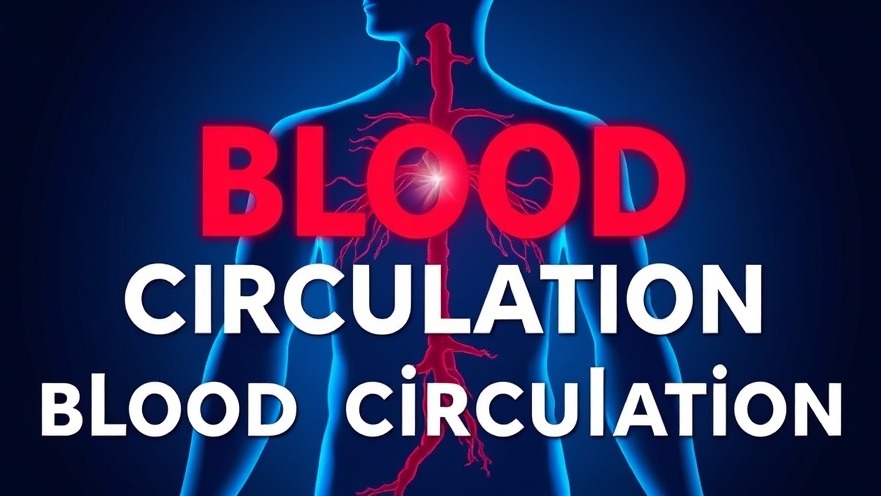
Understanding Blood Flow: The Lifeblood of Your Health
Your circulatory system plays a critical role in supporting health and vitality, but are you aware of its subtle signals? Interestingly enough, you don't need elaborate medical equipment to gauge how well your blood is flowing throughout your body. With just a few simple tests using your hands, you can perform self-assessments that can illuminate significant health insights.
In '3 Warning Signs Your Blood Flow Is Off — And How to Check It Yourself | Dr. Mandell', the importance of recognizing blood circulation issues is emphasized. This article expands on those vital insights by offering actionable self-tests and strategies for seniors.
What Can Your Body Tell You About Blood Flow?
Every day, your body communicates vital information regarding your blood flow. Signs like temperature changes, skin color variations, and even the condition of your skin indicate how efficiently blood is circulating. If you're feeling tired or unwell, this may relate directly to your blood circulation. For middle-aged and senior audiences, recognizing these signs becomes even more crucial as circulatory issues can impact overall health profoundly.
Simple Self-Tests for Circulation Health
There are three effective and non-invasive tests you can conduct right at home:
Capillary Refill Test: Press down firmly on the nail bed of your thumb. Release after a few seconds and observe the color return. If it takes longer than three seconds for your nail bed to regain color, it may signal poor circulation.
Skin Turgor Test: Pinch the skin on the back of your hand. If it fails to bounce back quickly, this may indicate dehydration or compromised tissue health.
Toe Temperature Check: Remove your socks and check your toes. Warm, pink, and symmetrical toes indicate good circulation, while cold or unevenly colored toes may reflect issues.
Armed with this knowledge, you can make informed decisions about your health. If you notice any irregularities during your self-tests, consider implementing activities that can help improve circulation.
Why Fluid Circulation Matters
Your blood serves as the body's transportation system, delivering oxygen, essential nutrients, hormones, and even waste products. When circulation slows, the repercussions can extend to energy levels, healing capabilities, and overall cognitive function. This is particularly important for seniors whose health can be adversely affected by poor blood circulation.
Steps You Can Take to Improve Circulation
If your self-assessments reveal any signs of inadequate blood flow, there are simple strategies to enhance circulation. Regular movement—whether it's walking, stretching, or even practicing yoga—can significantly improve your circulatory health. Additionally, hydration plays a pivotal role; ensuring you drink enough water daily can enhance blood volume and flow.
Breathing exercises and relaxation techniques such as tai chi or guided mindfulness meditation can also help regulate circulatory function while promoting stress relief. As we've seen, certain techniques can be beneficial not just for blood flow but also for mental wellness, offering a holistic approach to health.
Emphasizing the Mind-Body Connection
It’s essential to recognize the interplay between physical health and mental wellness. Stress and anxiety can lead to constricted blood vessels, further complicating circulatory concerns. This vicious cycle emphasizes the importance of stress management techniques for older adults—such as breathing exercises, journaling, and social engagement—which can play a pivotal role in promoting a healthier mindset and body.
Creating a Calming Bedtime Routine
Sleep quality can also be impacted by circulation. Implementing a calming evening ritual that involves deep breathing exercises and relaxation techniques can enable you to unwind and boost your sleep quality—greatly improving cognitive health and emotional well-being. Think about incorporating activities like light stretching or reading a book to signal to your body that it’s time to relax.
Encouraging Awareness and Action
The insights from Dr. Alan Mandel's video on blood flow offer valuable self-check strategies, motivating a proactive approach to one’s health. By utilizing hands-on methods, individuals can better understand their bodies, paving the way for healthier lifestyle choices that are crucial, especially as we age.
Make an effort to prioritize circulation and recognize its importance in the broader context of health. Fostering a healthy lifestyle can lead to profound changes, helping you maintain vitality as you navigate through your golden years.
 Add Element
Add Element  Add Row
Add Row 



Write A Comment